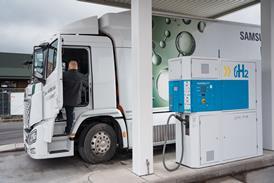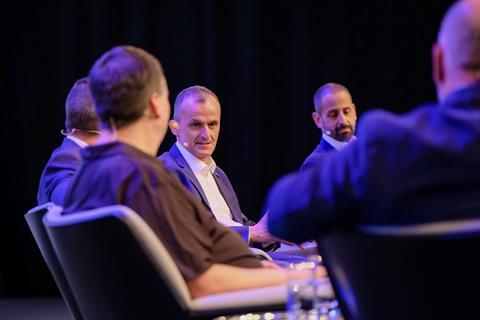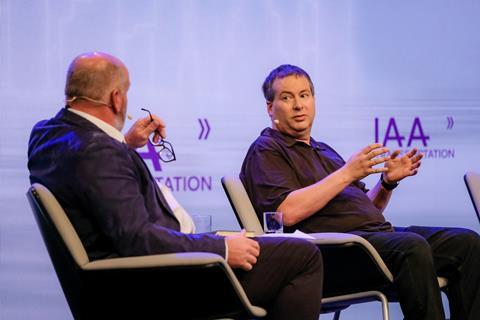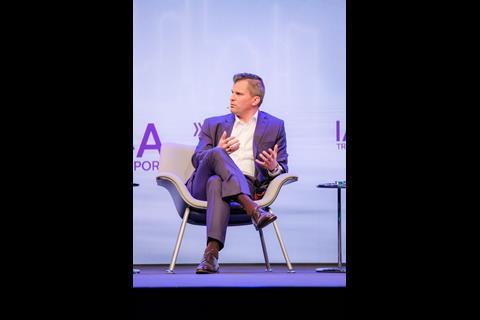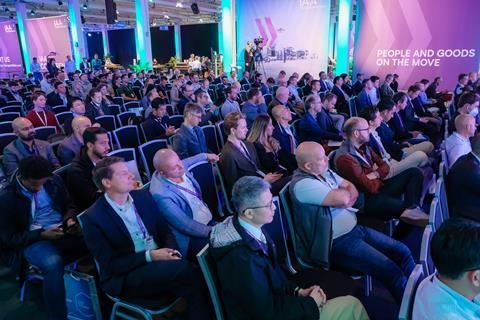In a recent panel discussion at the IAA 2022 Andy Salter – Managing Director of Freight Carbon Zero and former Editor of Commercial Motor - was invited to facilitate a panel discussion to address the BIG industry question: Hydrogen or Battery Electric is there a single solution? The panel was made up of Asher Bennett, CEO and Founder of Tevva Motors, Dr. Gregor Wiche, CTO Product and Production Technology at Voith Turbo, Essa Al-Saleh, CEO at Volta Trucks and Matthias Zink, CEO Automotive Technologies at Schaeffler.
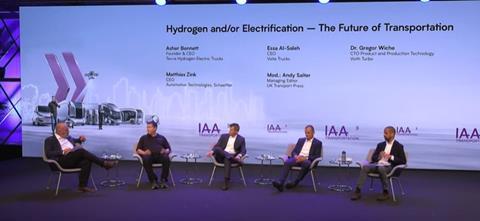
In his opening remarks Salter explained how he had approached the IAA Transportation exhibition in Hanover thinking the future was battery electric, but having seen the broad range of solution on display at the trade show things were very unclear. At the moment there looks to be two main players in the race to carbon zero, hydrogen fuel cell and battery electric with new technologies, with projects and infrastructure continuing to be centred around these two power types.
Kicking off the discussion was Schaeffler’s Matthias Zink stating: ”I guess we are going to see both competing for the best solution, competing for the infrastructure, competing for a reasonable total cost of ownership will lead to the right result. We still have this second market in Africa and elsewhere, so we can not only have the Voltas or others from scratch with reliance charging infrastructures. But long-term, we will probably converge towards hydrogen and for lower range battery electric. But we are going to see for a long time a broad selection of solutions, that is my view on it.”
Asher Bennett, CEO at Tevva, had unveiled a new hydrogen fuel cell electric vehicle at the exhibition and also has a battery electric vehicle range on offer: ”Each technology has advantages and each technology has disadvantages, so let’s take the advantages and overcome the disadvantages,” Bennett said. “Lithium-ion batteries are a great technology, grid electricity is relatively abundant, but it has limitations. The limitation is not the range per se as you can always put more batteries on the vehicle - but for the same amount of battery energy you will get very different ranges, especially in trucks, depending on operation. Is the truck fully loaded or not? Are you climbing the Sierra Nervadas in Spain at full speed or on a flat surface at a nice ambient temperature? Do you have a good driver?
”Once you start putting a lot of extra energy on the truck in the form of a battery, it will get very heavy and the chargers for a very very multi kilowatt hour battery (to charge in a reasonable time), I like to say as a joke but it is real, will cost more than the truck. And that’s not a great solution,” he added. ”Hydrogen has faster refuel and has much better energy density compared to lithium-ion batteries. It has big downsides, its expensive, fuel cells are expensive. But if you put them together there is certainly a way to take the benefit of both.”
Volta Trucks’ CEO Essa Al-Saleh shared a similar view. Volta is developing a misson-specific battery electric vehicle squarely aimed at urban delivery operations. ”Our mission and the burning platform is to drive towards a sustainable future, that’s what we are all solving for and need to solve for with urgency - that is the number one priority. At this time it is a transition and in any transition you have to explore other things. What we are doing at Volta is committing to a use case that we can solve for today or very shortly and have an impact today rather than in the future. We will bring an application and a cost benefit for our customers as soon as possible.”
Gregor Wiche the CTO product and production technology and Voith - the company has a range of e-drive solutions for battery electric vehicles and are also specialists in hydrogen storage systems: ”Of course, we would love to know if it is going to be hydrogen or battery electric as the replacement for diesel. Personally, I believe battery electric is going to be the predominant solution, but I also believe that the commercial vehicle market is much more diverse when it comes to applications. There is, I think, plenty of room in the foreseeable future for the battery electric applications and I think there is a very valid need for more energy dense storage and longer term range and that is favouring hydrogen or something else that we have not thought about today.”
The views of the expert panel followed a familiar theme: Battery electric remains the most effective solution for light and medium duty operations and could be an option for long haul activities, but it has shortcomings, not least the need for an extensive charging infrastructure; hydrogen fuel cell by contrast offers better energy density than battery electric, will solve the refuelling and range issues, BUT producing hydrogen at scale and delivered to the refuelling point, still has to be worked out. There remain many unanswered questions, but these are now largely technical barriers to be solved with time and money, and we would expect breakthroughs from both in the near term to clarify the specific use cases for both power types.

